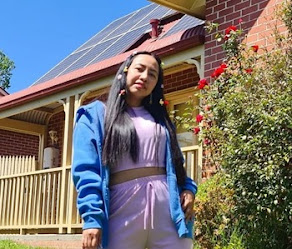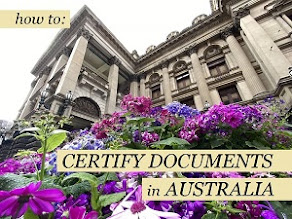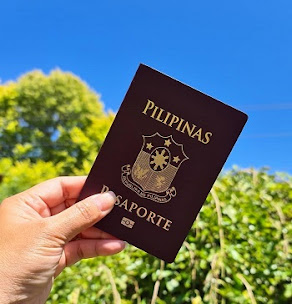Have you experienced attending some beauty pageants?
Some of you might say, it’s the Q & A part, some might say the bikini or swimsuit competition (yeah sometimes I wonder how blessed they are!).
Pageants are about beauty and brains, and how these candidates will contribute and influence the community. Those are given.
However, I love watching local beauty pageants because of the combination of creativity and fashion.
I love watching these candidates, modeling their dresses loaned from various fashion designers, and I find it so exciting seeing the creativity of the designing team.
Beauty pageants are like watching runway shows, and that’s true.
We used to have this viewing party with my best friend and her siblings at home, all things prep-up before the show on television, and we are so serious with our bets, laying down all our cards - our favorite selection of drinks and snacks, and who ever wins, she/he wins the pot of snacks!
LOL. I miss those days!
This dress reminds me of the spring season!
This year’s Binibining Pilipinas 2018 national costume presentation is something that I find more interesting and improved a lot, compared to the previous years. The dresses are more creative, with lots of spirits, the dresses have properly represented based on the inspiration (culture or tribe) plus, am seeing less skin, which is more appropriate.
If you are not familiar with the Philippines, then you can learn something from these national costume presentations. The Philippines is a country composed of many cultures and tribes, thus we have more than two types of national costumes.
Each dress are representing their tribe or culture, making the Philippines a melting pot of different cultures, and all grown-Filipino plus incorporating some modern touch.
I also noticed that these years national costumes are more creatively done, seeing all those weaved fabrics, intricate beadings, and the most important part – they are wearable, and not out-of-this-world-kind of dresses.
Disclaimer: I don’t know the designers who collaborated for this presentation, however, I would share my thoughts based on my memories and stories of our cultures. But prepare for some little roasting along the way.
Check these photos and let me know which one is your favorite.
The combination of white-and-green shade is always a fresh choice, and has that eco-friendly appeal. Adding that this dress is inspired by the country’s national flower, the sampaguita aka, the jasmine flower. If you visit the Philippines, you will see these sampaguita necklaces being sold to most churches, busy streets, to both locals and foreign guests. If you visit Manila, these sampaguita necklaces are being sold by many Aunties and kids who want to earn extra income, for school projects.
I’ve seen this kind of unique stitching worn by the traditional women and tribes in the Maguindanao region. I’ve learned from the previous exhibitions that the strong color of black, decorated with red, orange, and yellow stringing symbolizes power and authority. The bold beading accessories also symbolize high status in the community or tribe they belong, including that feathery headdress. Isn’t it very interesting?
This is another Maguindanaon-inspired married with the touch of Spanish culture (the ruffles). The headdress and necklace are phenomenal.
A red dress always makes a lady stand out from the crowd, and her dress reminds me of that traditional Chinese paper-cutting artwork during the Lantern Festival. It is creative and I am curious about the hours the designer spent doing the stencils.
The Philippines is a country with an important coconut industry, that every island has coconut trees. And the coconut juice gives us that miracle of healing and cleansing. This dress is a clear inspiration of the industry, and I love that the designer adds those traditional coconut shell buttons (my brother used to make those for my dresses). The pride of the coco industry is alive!
Another dress inspired by the Mindanao region, with the touch of flickering fire and sun rays. I like the intricate embroideries of the fabric. Minus the accessories (fan + headdress) and the cape, this dress would be a fabulous dress for the Oscars.
Do know that the Philippines has gained a moniker as the “Pearl of the Orient Seas”? This name was originated from the idea of Spanish Jesuit missionary Fr. Juan J. Delgado in 1751. The name was also used in the famous poem Mi Ultimo Adios by Jose Rizal and is also in the Philippine national anthem (its Tagalog translation, “perlas ng silanganan”).
Pearl farming is also an important industry in the Philippines and the source of the famous golden South Sea pearls. Most pearl farms are located in Palawan.
Being said this dress is a perfect representation of the glorious Philippines as the Pearl of the Orient Seas – although the pearl clam headdress is overpowering AF, and quite animated. The dress per se made of weaved beads and faux pearls looks like the deep ocean’s healthy corals dancing freely along the waves of waters. Minus the short sword, this dress is fantastic.
On the island of Marinduque, Philippines there is this annual Lenten festival called Moriones Festival. The “Moriones” are the men and women in their army-clad costumes and mask replicating these early Roman soldiers during the days of Christ. I don’t like the background story of this festival which depicts the power Roman soldiers had during those days and how much scare and sufferings it brought to the people, these armies of early Roman Catholic religions are such an asshole.
However, that hand-painted cape is adorable, that looks like King Leonidas (starring Gerard Butler in 300 movies) in Roman armour-clad. LOL.
I personally like these embroideries and adding a huge pile of tulle, which makes this dress a lovely wedding dress (but not on the church, but a garden wedding theme). I like that it wasn’t too naked (technically it has a naked-color fabric underneath) but classy.
Makes me wonder, can we make it a trend again to use those embroidered summer umbrellas?!
Another dress that is inspired by an ethnic dance from the Philippines is called Banga Dance. Banga, means earthen spherical jars are used for fetching water and are mostly adopted by the northern region of the Philippines. One of the interpretative dances called Banga dance is performed by Kalinga women showing their agility in balancing the earthen jars on top of their heads while toddling through rice paddies and mountain paths; a daily routine to fetch water from the mountain springs.
The dresses of the Kalinga women for the banga dance are incredible, using their hand-woven fabrics and intricate beadings. This dress is a modern inspiration, however never I’ve seen a Kalinga dress with chains on it. Adding chains in a traditional dress is not a good idea (as you know, chains symbolize slavery when used on dresses and people) if you know what I mean.
As you know, the Philippines is the country in Asia being dominated by Catholicism and this religion has been incorporated into the Filipinos way of life, and even in fashion. This royal blue dress looks elegant that reminds me of the gorgeous ocean waters of the Philippines, and that huge rosary necklace symbolizes the huge Catholic faith of the country, during the Spanish era.
And that huge crown! Geez, it reminds me of those crowns being used by the runways Barbies, at the recent Dolce and Gabbana Spring Summer 2018 collection. I bet Stephano will give a nod for this dress.
Okay, I’m definitely feeling it’s already a summer season here in the Philippines. I’ve just recently finished my DIY sunshine-yellow dress in preparation for my summer sojourn and got myself a pair of yellow bikinis. And seeing this head-to-toe sunshine yellow dress, makes me scream “Hello Miss Sunshine!”
I honestly haven’t seen a traditional Filipino national costume like this in my entire life, not unless the designer is getting inspiration from that mythical bird, sarimanok from Mindanao, or a golden phoenix!
The golden dress looks fabulous, minus the golden bird headdress. Adding them together makes this whole look mythical and unreal.
As I’ve said previously, black is power and elegance. However, black also symbolizes sorrow. And if I will be in that state of my life, I would never wear those black, dull and shapeless, widow dresses if I could have a chance to wear this black dress! Cheers do that!
This dress screams royalty! This isn’t in Bhutan but in the Philippines. Those complex beadings and fabrics used are so luxurious, no wonder these types of dresses are being used for a formal occasion. Minus the headdress, of course.
Am now imagining how complicated to wear this dress, knowing that is it made of kapis shell or those nacres from oysters, which are so fragile. You will see these kapis shells being made as chandeliers and lampshades, or being adorned with some home accessories, including window panes! And adding these kapis shells to an evening dress is another level-up. Kudos to the designer for making this dress.
Another modern evening dress using satin fabrics and traditional woven fabrics from a local weaving community. I love this dress, and I think removing those sleeves and the long drapes will turn into another unique and classy long evening shift dress.
How many layers of fabric does it have? I don’t know either, but it reminds me of those ocean waves in Siargao Island. Classy, traditional but modern – this dress is stunning.
Most ladies I know have that mermaid-fantasies in life, and this white shift dress with a mermaid tail is such a good hit. It is elegant and sophisticated-looking can also be a perfect wedding dress. If I would be getting married (even I'm not into it), this dress with me on my top 3 choices. Now, who’s the designer??!!
Another one-of-a-kind dress that is made of indigenous materials like wooden buttons and beads, weaved mats made of grass, and anything that you can be found locally. I adore the whole concept and designs, and the model has presented it well with her fierce look, which tells “don’t mess with me, bitches”.
The Philippines is not only about beautiful beaches and natural resources, and beautiful women (yes according to the ex-pats I know), the country is also rich with unique culture and traditions, including folk music and instruments. When I was in grade school we used to study these instruments, and surprisingly they produce amazing sounds, all are very therapeutic.
This dress and the model’s look reminds me of the Philippine version of Japan’s geisha, where geishas are top performer artists, well respected with their unique crafts.
How long does the designing team have consumed to create this striking dress? Am looking at the details and the beadings, and literally, I am jaw-dropped. I could imagine the heavy it weighs, adding that sarimanok headdress. This lady knows how to balance!
This dress is also stunning and wearable for any formal occasion. Its conservative design is incredible. But I would keep my nails shorter, and not accidentally hurt my colleagues.
I love emerald green. It is elegant, and scream money!
A dress that reminds me of those porcelain jars from the Ming Dynasty. Or my Mom's untouched dinner plates all displayed in her cupboard, like serious Mom?!
Another dress that incorporates religious faith. I love the designs and those details. If Dolce and Gabbana would add a Filipino touch to their designs, this could be the look.
This one reminds me of those sophisticated women wearing this traditional formal dress during the Spanish era. Now I want to get to know the designer and many have an opportunity to visit their atelier!
If you love the neutral-toned dresses, then this one is for you. The details are impeccable and stunning!
I love the vertical-weaved traditional fabrics that they’ve used with the blue satin. It gives more emphasis to the culture and makes the traditional fabric look more bespoke.
Am not so sure which part of the country represents this national costume, and yeah I find it another animated or mythical type. More of a cosplayer outfit? However, I would give a thumbs up for her headdress and the beadworks – geez those things are fabulous!
And my most favorite of all – this dress inspired with the Muslimah fashion. Finally, someone has thought of the idea of including our Muslim community in the mainstream. This dress is very elegant from head to toe, inspired by the traditional modern Muslimah wedding dress (I’ve seen some of it in royal weddings in Malaysia). And see those lace? OMG, it is luxurious!
Overall, this year’s national costumes presentation is more tasteful compared to the previous years. Most of this year’s dresses are wearable in real life and integrate perfectly the old tradition to modern style. I hope many local designers would start creating and promoting this theme because our cultures have lots to offer.
Now I wonder who these designers are because I want to thank them for presenting their creations!
The coronation night will be this 18th of March. Photo credits to Binibining Pilipinas Facebook Page.
Which of these dresses do you love? Or maybe hate?



























































Like you, I also love the costume part. I love seeing how creative some people can get. In this series of photos, the coconut tree (no. 8) catches my eye. In a way, it is cute and humorous, yet depicts and important industry of the country.
ReplyDeleteThanks Emily! And that is a real coconut fruit there :D
DeleteI love the gown/dress of number 3 and pearl of the sea. It’s so stunning! If only I had the opportunity to wear either one of them
ReplyDeleteYeah that pearl-inspired gown is gorgeous! Its like corals!
Deleteomg omg omg! i love the dresses! Philippines has so many talented designers! i was picking my fav then i lost count coz there's just too many that are pretty!
ReplyDeleteHahaha thank you! Hope to see a pageant as well in Kuala Lumpur :D
DeleteI love to watch beauty pagaents. The participants have really beautiful and stunning gowns.
ReplyDeleteThank you Linda. I don't much into Q & A because for me all of them are beautiful and intelligent. I like the work of arts - the costumes and dresses.
DeleteLove all the costumes here! So pretty leh =D
ReplyDeleteThank you babe!
DeleteWow, I was really speechless while seeing all these beautiful national Costumes.This is just means that Filipinos are great designers and they truly treasure the rich culture of the Philippines. I have not watched BBP, but I'm sure it was really fun watching the stunning ladies on the stage.
ReplyDeleteYeah, how I wish to borrow one of their dresses!
DeleteAll dress so beautiful and don't know which to choose
ReplyDeleteLOL its overwhelming, right? :D
Delete